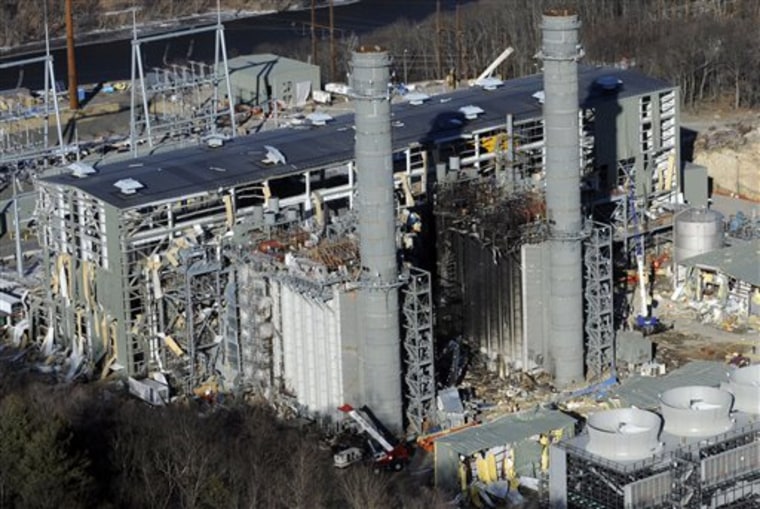The nation's top workplace safety agency imposed $16.6 million in fines Thursday against companies involved in a power plant blast that killed six workers and injured 50 others.
The fines, the third-highest imposed for a single accident, stem from 371 alleged safety and workplace violations at the Kleen Energy Systems natural gas power plant in Middletown.
The companies "blatantly disregarded well-known and accepted industry procedures and their own safety guidelines," the U.S. Occupational Safety and Health Administration said in announcing the fines Thursday.
"They simply and tragically refused to use common sense," U.S. Labor Secretary Hilda Solis said Thursday. "The deaths and injuries could have been prevented had the companies placed safety first."
The under-construction facility exploded Feb. 7 when something ignited natural gas and air that had accumulated in tight quarters during a "gas blow," a procedure in which high-pressure gas is forced through pipes to clean them.
The ignition source hasn't been identified, but welders were working nearby and gas and diesel heaters were left running during the gas blow on that chilly Sunday — defying safety rules and common sense, OSHA officials said.
The largest proposed fine levied in the case is $8.3 million against O&G Industries of Torrington, the general contractor. Keystone Construction & Maintenance of Rowley, Mass., which oversaw the gas blow, was fined almost $6.7 million.
Sixteen other companies also face potential fines, ranging from $7,000 against several small contractors to more than $896,000 against Bluewater Energy Solutions of Acworth, Ga., which was supposed to oversee the safety and training for the gas blow.
Messages left Thursday for representatives of O&G Industries and Bluewater Energy Solutions weren't immediately returned. Keystone said in a statement that it had just received the OSHA citations and may comment after reviewing them in more depth.
The companies have 15 days to pay or contest the fines.
The fines represent the third-largest total imposed by OSHA for a single accident; the first two were both against oil giant BP for a 2005 explosion killed 15 workers at a Texas refinery.
The large companies involved in the construction project were rushing to complete the plant, OSHA officials said, and some stood to collect millions of dollars in bonuses for an early finish.
The rush was not specifically pinpointed as the cause of the ill-fated gas blow, but Solis said some victims' family members raised concerns about it when she talked with them.
"They were alluding to the fact that (the workers) were exhausted and that they were overworked, and there wasn't a good explanation except to hurry up with the work," Solis said. "In some instances, I was led to believe that safety may not have been the highest priority."
OSHA is also sending warning letters about the dangers of gas blows to companies involved in the 125 gas-fired turbine power plants currently planned or under construction, OSHA head David Michaels said.
He said OSHA cannot immediately ban the procedure permanently, because it would take years to change federal standards that govern those workplace practices. An emergency ban could only last for six months — and only if OSHA could show that a moratorium is the only option.
Gas blows can be performed safely if done correctly, Michaels said, though OSHA hopes the warning letter and publicity about fines in the Kleen Energy case motivate other power plant builders to use safer pipe-cleaning procedures.
Workplace safety groups say air or nitrogen would be safer than natural gas.
The U.S. Chemical Safety and Hazard Investigation Board, which is also examining the blast, says gas blows are inherently unsafe and has urged companies to use other practices. It recently completed its analysis of a battered gas-detection meter salvaged from the scene, but has not yet released the results.
Hundreds of workers have returned to work at the Kleen Energy facility, which was 93 percent complete at the time of the blast, according to state records.
The state permit for construction at the site expires Nov. 21, and Kleen Energy has asked the Connecticut Siting Council for an extension through June 30, 2011. The regulatory agency expects to decide in September.
Middletown detectives and state police are investigating whether any people or businesses should face criminal charges in connection with the explosion and deaths. Attorneys for 10 injured and deceased workers have also filed civil lawsuits.
